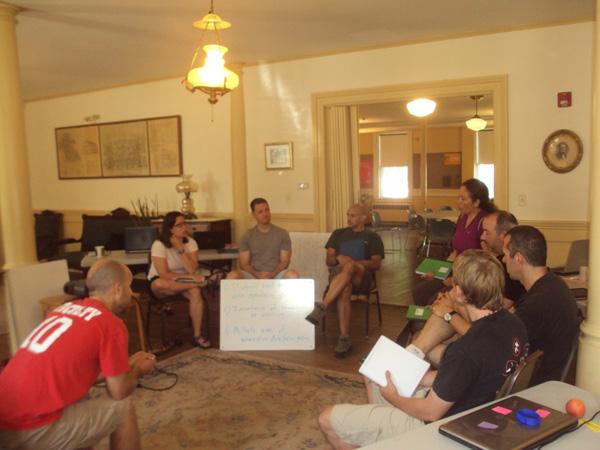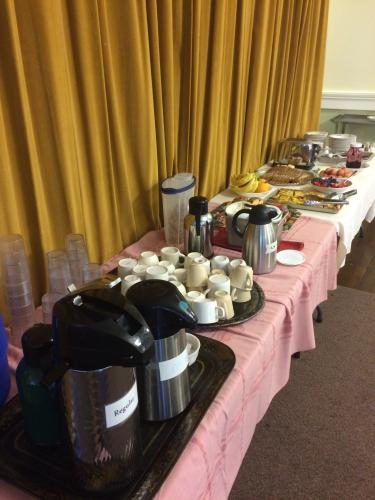Dates: Workshops run Monday – Friday from 8 am – noon and 1 – 5 pm (1 hour lunch break).
Session 1: TBD
Session 2: TBD
Each one week chemistry or physics workshop is limited to eight (8) hosted participants/week and up to four (4) non-hosted participants. Hosted participants are housed for free locally by community members, please check out hosted housing requirements.
Select week long sessions in chemistry or mechanics (details below).
Please note: If there is insufficient enrollment (less than 4/workshop) a workshop may be cancelled. If the workshop becomes oversubscribed, waiting list participants will be provided alternative sites to attend.

Workshop Leaders
- Thomas Pfeiffer has been teaching modeling instruction chemistry and physics at Bellows Free Academy, Vermont since 2003.
- Matt Watson: After teaching high school physics via traditional methods for 10 years, a 2002 Modeling Instruction Workshop transformed his classroom. Since then has deployed Modeling Instruction in both 1st year and 2nd year high school physics courses at all levels at Great Valley High School Physics Teacher.
- Director: Jamie Vesenka, Professor of Physics, University of New England, has taught modeling physics at the college level since 1999 and currently support the two Master Teachers in their modeling instruction.

Continental breakfast and a homemade lunch are included each day of the workshops.
Intro to Modeling
The workshops thoroughly address all aspects of middle & high school teaching, including the integration of teaching methods with course content for chemistry and physics classrooms. Special emphasis will be placed on modeling conceptual development and integrating technology appropriate for the middle and high school.
Week 1 participants in chemistry and physics will be introduced to the Modeling Method as a systematic approach to the design of curriculum and instruction. Participants will be instructed on computer hardware and software selection, techniques for laboratory data collection and analysis, and internet use to help them become experts on the best uses of technology in education. Participants will be given techniques to deliver in-service training and help in strengthening local teacher alliances. Week 2 participants must have received at least one week of modeling instruction previously as they are more content heavy and require modeling instruction foundation.
Workshop Content
Dates: TBA
Workshops run Monday – Friday from 8 AM to 5 PM with a one hour break for lunch provided by the workshop. A continental breakfast is provided in the morning at the workshop. Participants are free after the workshop to find evening meals at the numerous food establishments found in The Kennebunks. Dive deep on our Venue & Accommodations page.
Traditionally, week 1 of chemistry 1 or mechanics 1 cover the equivalent of year-long college prep science. Combining weeks 1 and 2 is equivalent to a one year honors course.
In all workshops the modeling process takes priority – ultimately it is understanding and embracing the learning cycle that will make the biggest impact on student comprehension and confidence.
Certificates of Participation will be earned for each week. Affordable graduate credit is available through the American Modeling Teachers Association. Contact hours (approximately 36 hours/week) entitle participants to at least one graduate credit/week. Additionally, work is required to be completed and assessed by the instructor. Credit must be arranged with instructors before starting instruction – instructors will contact participants one or two weeks before the start of the workshop with details. Please note, you will be busy. Face-to-face workshops cover a lot of ground and time in part to satisfy graduate credit requirements.
Program Details
Content from first semester high school chemistry or introductory middle school physical science is organized around seven basic models to simplify structural coherence:
Week one:
1. Physical properties of Matter
2. Energy and States of Matter I: Particles in Motion
3. Energy and States of Matter II: Sticky Particles
4. Describing Substances
Week two:
5. Counting Particles Too Small to See
6. Particles With Internal Structure
7. Chemical Equations
8. Stoichiometry
Content from first semester high school physics or introductory middle school physical science is organized around seven basic models to simplify structural coherence:
Week one
1. Measurement and Graphing with an emphasis on linearization.
2. Constant Velocity Particle Model
3. Constant Acceleration Particle Model
4. Free Particle Model (∑F=0)
5. 2-D Particle Model (Projectile Motion)
Week two
6. Constant force Particle Model (∑F=ma)
7. Energy Model
8. Central Net Force Particle Model(Circular Motion)
9. Impulsive Force Particle Model (Momentum)
This video demonstrates one of the exercises performed for modeling waves at our workshops.